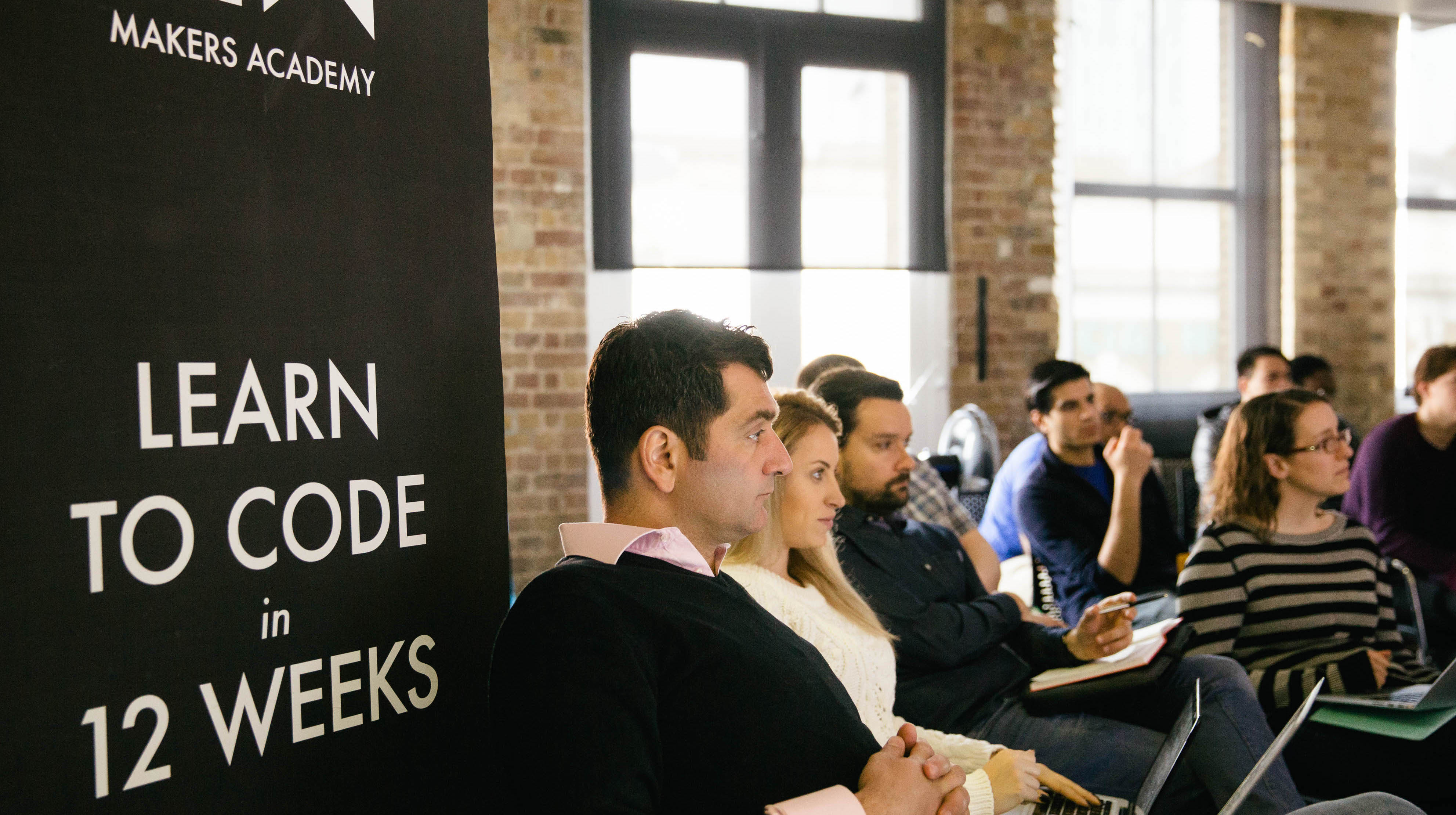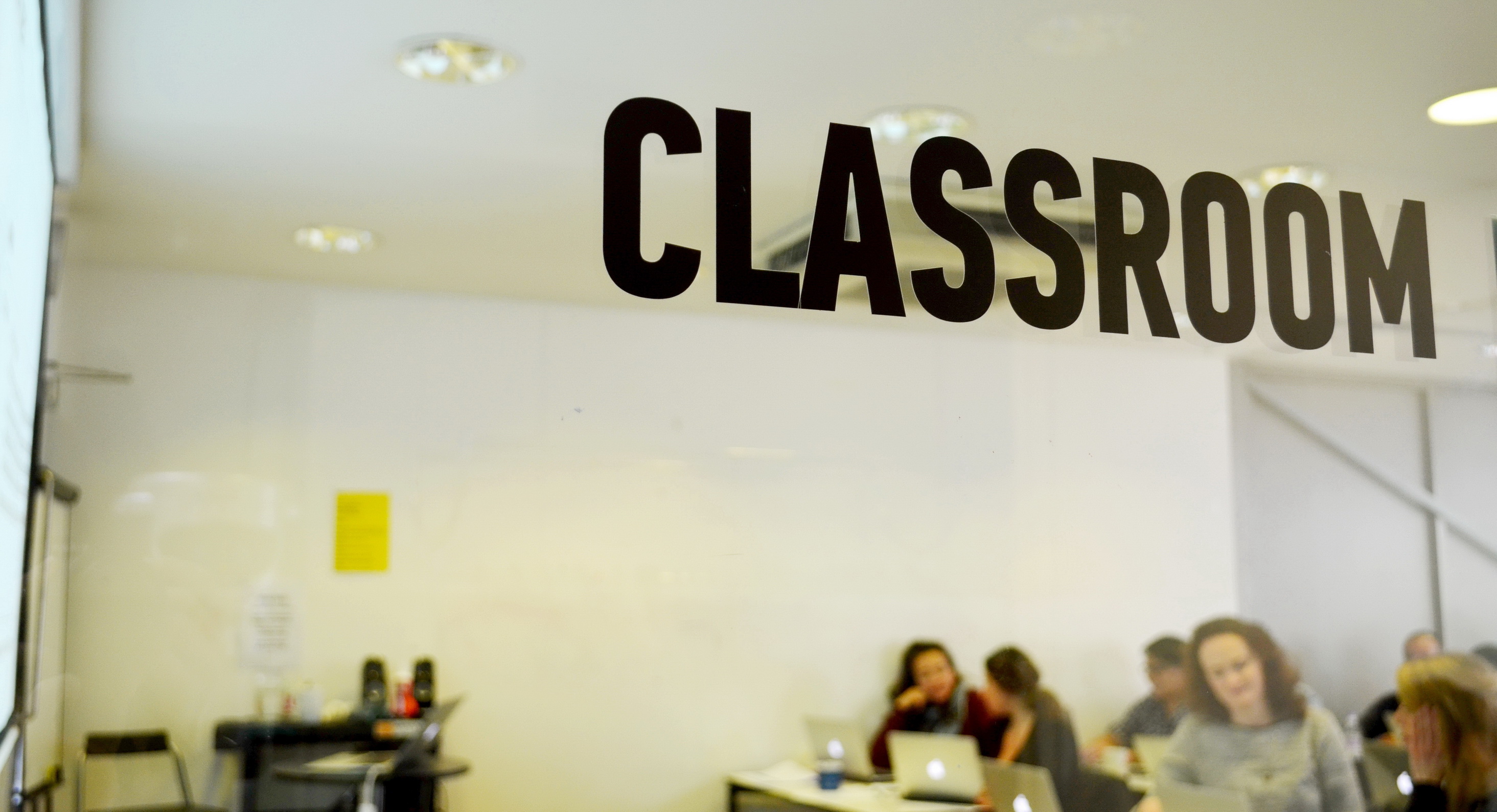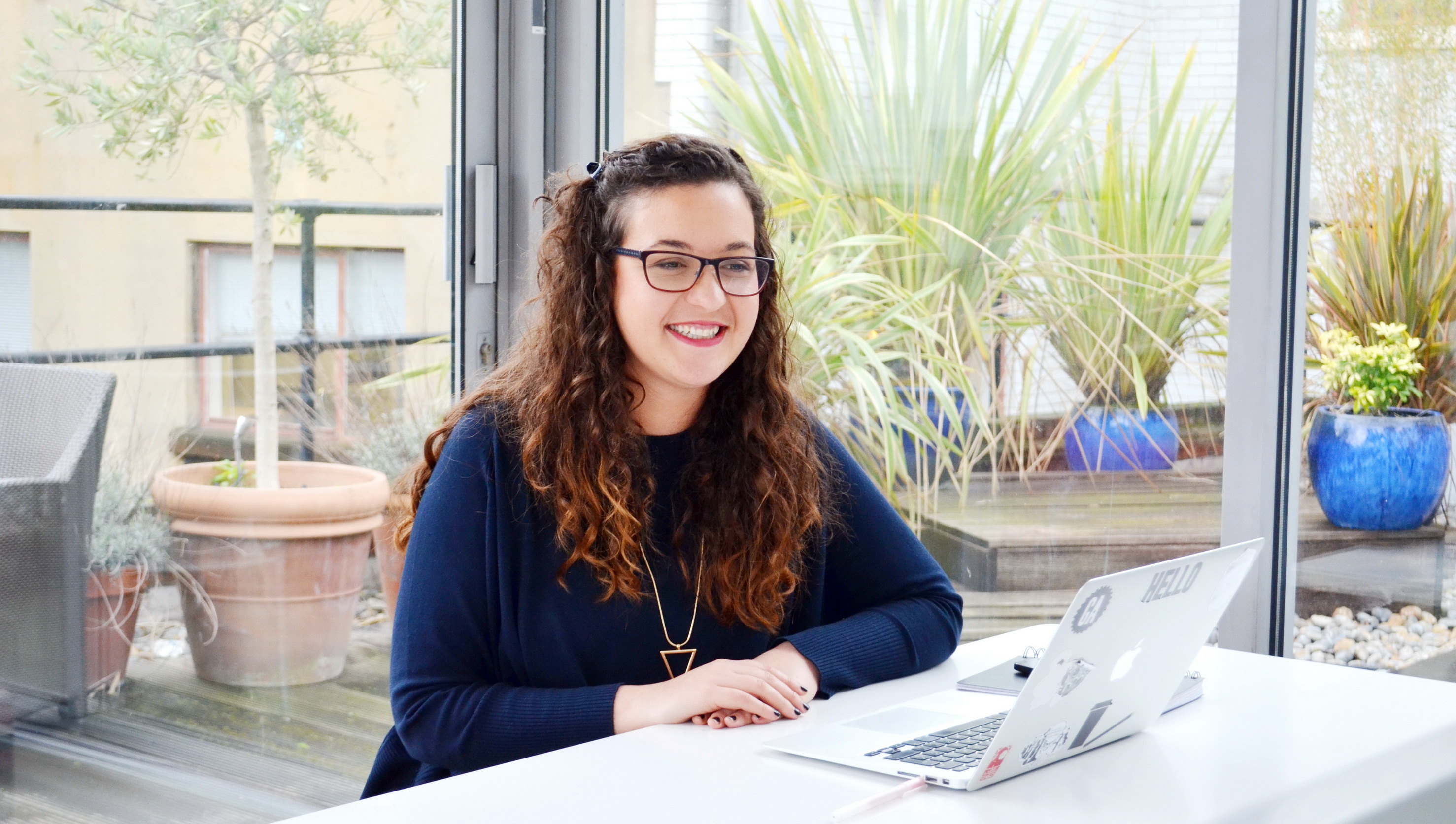The class is concentrated on the lines of code projected on the screen. The coach leads a collective effort of finding errors letting students spell out the mistakes. It doesn’t look like a traditional class, the atmosphere is rather chilled but professional. Surrounded by laptops and PCs, a dozen of soon-to-be developers contribute, ask and answer as well. It is a collaborative space with people of strikingly different backgrounds who decided to invest in their coding careers.
Makers Academy offers 12-week intensive web development course that says anyone can code with the right amount of efforts and time invested. Next to current trainees, the alumni type away fully absorbed in the search for opportunities. We chat to Alan, who after years spent at various levels of management in the food and retail industries, decided to follow his passion and retrain as a web developer. According to Ruben Kostucki, COO at Makers Academy, the average starting salary for the graduates ranges from £30-32,000. To date, over 500 students have graduated from the course starting their new careers at the companies like Financial Times, Mergermarket, Thoughtworks, the BBC, Springer and many others. The demand in skilled developers and programmes isn’t predicted to be decreasing in the visible future. In our recent conversation, the co- founder of the Academy Evgeny Shadchnev noted the demand for high-skilled talent, especially in technology, is high but it “is disproportionately skewed towards more experienced candidates, often wrongly assuming that junior employees won’t deliver value for a long time.” To change it, the Makers Academy is replenishing the market with junior developers. To find out what more is on offer, we met three MA graduates.
What is your background and why did you decide to sign up for the course? Why did you choose Makers Academy?
 Anindya Bhattacharyya: I worked as a journalist for 20 years or so, writing on everything from derivatives trading to oil tankers. But I was getting increasingly frustrated by industry trends and wanted to switch to something with more of a future. Makers struck me as ideal both in terms of the content of the course and the way it explicitly positioned itself as something that would suit mid-life career changers like myself.
Anindya Bhattacharyya: I worked as a journalist for 20 years or so, writing on everything from derivatives trading to oil tankers. But I was getting increasingly frustrated by industry trends and wanted to switch to something with more of a future. Makers struck me as ideal both in terms of the content of the course and the way it explicitly positioned itself as something that would suit mid-life career changers like myself.
Simon Legg: Since leaving school at the age of 16 I was working for a trade & re tail decorators merchants. My brother introduced me to coding as a developer himself and I really enjoyed it. I decided that I’d like to pursue it as a career so looked around for places to study. I’d seen adverts for Makers Academy so went to check them out. I read some reviews and spoke to a couple of my brothers ex-colleagues who had gone through the course and were very complimentary about it.
tail decorators merchants. My brother introduced me to coding as a developer himself and I really enjoyed it. I decided that I’d like to pursue it as a career so looked around for places to study. I’d seen adverts for Makers Academy so went to check them out. I read some reviews and spoke to a couple of my brothers ex-colleagues who had gone through the course and were very complimentary about it.
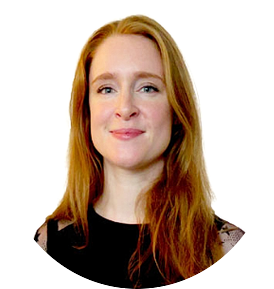 Kirsten Jones: I used to be a solicitor working on project financing and acquisitions in the energy and infrastructure sectors. I decided to do the course because I was considering a career change and wanted to see where my interest in programming could take me.
Kirsten Jones: I used to be a solicitor working on project financing and acquisitions in the energy and infrastructure sectors. I decided to do the course because I was considering a career change and wanted to see where my interest in programming could take me.
Except technical knowledge, what is the most valuable learning you got from the course?
Anindya: Getting a sense of how the industry is structured: what the different roles are, what the trends are, how the landscape is populated with big firms and small ones etc… Makers provided a valuable introduction to the peculiar culture of the tech industry.
Simon: It is important that Makers Academy teaches you to think about approaching a problem and to think about how to solve it before actually solving it.
Kirsten: We were given some useful tips and advice – like the fact that you will never know everything and you need to be comfortable with that in this job. There will always be something new to learn.
How intensive was the course and how did the instructors ensure everyone kept up with the speed?
Anindya: It’s very intensive (the “Bootcamp” moniker isn’t inaccurate), and you do need to be self-motivated. But it’s very well tutored, with the emphasis on learning by problem-solving rather than traditional lessons or classes.
Kirsten: Intense. More or less no time off for 16 weeks – maybe the odd day or half day at the weekend. You can really work as hard as you want to – the building stays open until 9pm on weekdays. There are regular code reviews and learning objectives questionnaires to fill in. I guess if you have fallen behind the instructors could use these to track it. But most people are motivated enough to keep up without being chased.
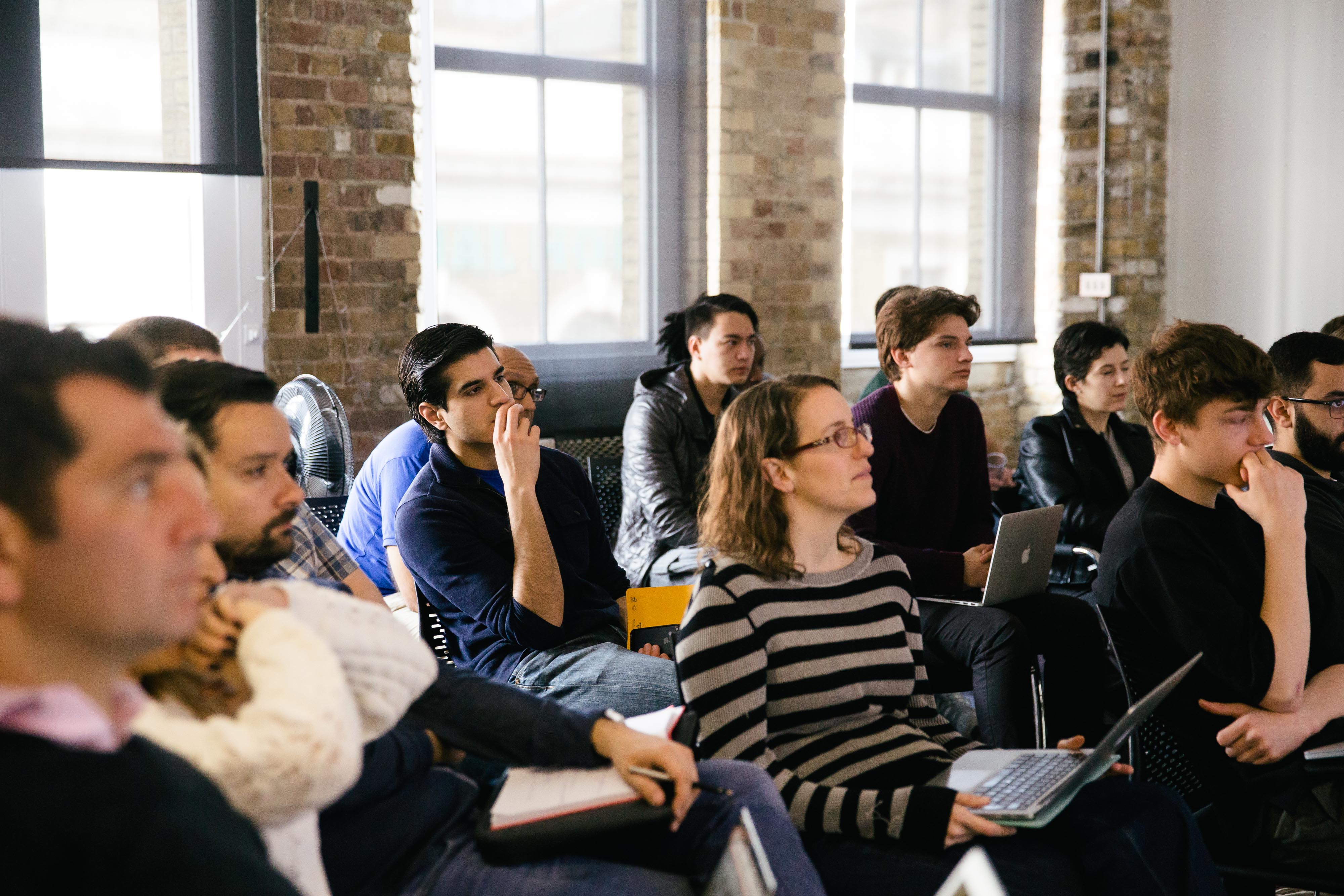
“The careers team helped with the whole process from giving tips on how to put together our CVs to providing (pretty intense) interview practise.”
How helpful was the course in kickstarting your career as a developer?
Anindya: Very helpful indeed – I applied for my first and current job at PensionBee via Makers. The post-course support is excellent and they are good at matching your talents/interests to the opportunities that are out there.
Simon: Oh masses! I work at the Financial Times now and I love it. Without Makers Academy I probably wouldn’t have considered joining such a big organisation. FT presented at a careers fair in the last week of the course which is where it even entered my head to apply for them. The careers team helped with the whole process from giving tips on how to put together our CVs to providing (pretty intense) interview practise.
Kirsten: Very useful. Makers Academy combines technical learning with career advice – you get to know about what opportunities are available in the industry. In addition, Makers has partnerships with various companies. You hear from or meet representatives from those companies and essentially have an introduction.
“There’s great demand for high-skilled talent, especially in technology.“
Would you recommend the course to your friend? Why?
Simon: If one of my friends wanted a career as a developer I would definitely recommend the course. It is a great place to meet great people. It is an incredible learning environment with passionate coaches. I would stress, though, you get as much if not more than you put in. If you don’t help yourself the coaches won’t help you.
Anindya: Yes, definitely. Anyone thinking of getting into software development should consider it.
Any advice for those thinking about doing the course?
Simon: Make sure you want to do it firstly, I’m sure there were people who halfway through the course realised that they didn’t actually want to do it. As I said, you get as much if not more than you put in. So you need to be prepared to think and help yourself.
Anindya: Apply for a careers development loan to fund it. Get hold of a MacBook if you can. Don’t be put off by the mystique surrounding programming – it’s a lot easier than people think it is, and if you can tie your own shoelaces you can learn to code.
Jobbio in conversation with Evgeny Shadchnev, co-founder and CEO at Makers Academy
Opportunities at London’s hottest startups | All tech roles in one place

